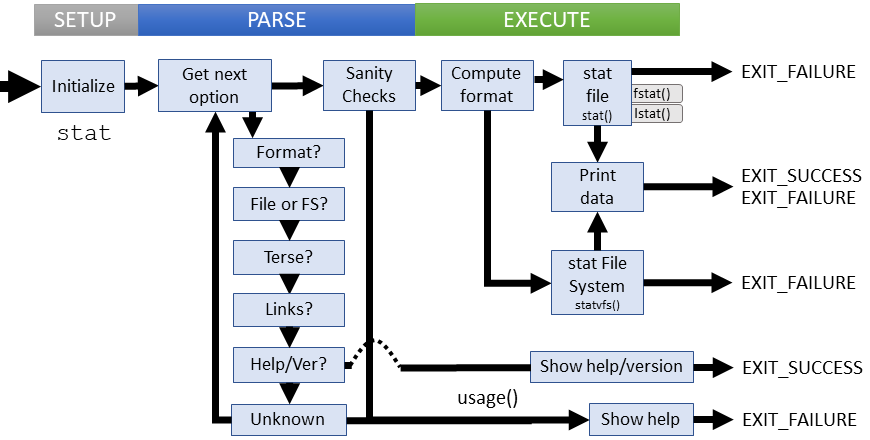[GNU Manual] [No POSIX requirement] [Linux man] [FreeBSD man]

Summary
stat - report file or file system status
Lines of code: 1686
Principal syscall: statvfs()
Support syscalls: stat(), fstat(), lstat()
Options: 11 (4 short, 7 long)
This is a relatively recent utility
Added to Shellutils in November 2001 [First version]
Number of revisions: 244
Don't confuse this stat utility with the stat() system call. This utility is for displaying detailed file information beyond that of other utilities, like ls.
default_format()- Applies the default format string (File, ID, Block size, etc)do_stat()- The formatted stat procedure for filesdo_statfs()- The formatted statfs procedure for filesystemsfind_bind_mount()- Retrieves the mount point for the name from the mount listget_birthtime()- Finds the creation time of a filegetenv_quoting_style()- Sets the quoting style depending on environmenthuman_access()- Retrieves file the access string (i.e. drwxr--r--)human_fstype()- Returns a string describing the type of file systemhuman_time()- Formats a readable timestampmake_format()- Finalizes the pformat with only allowablesneg_to_zero()- Returns a zero timepsec for comparisonout_epoch_sec()- Oututs the number of seconds since an unput timespecout_file_context()- Prints the security contextout_int()- Outputs a signed integer and returns the character countout_minus_zero()- Outputs the number without any decimal precisionout_mount_point()- Prints the mount pointout_string()- Outputs a string and returns the character countout_uint()- Outputs an unsigned decimal integer and returns the character countout_uint_o()- Outputs an unsigned octal integer and returns the character countout_uint_x()- Outputs an unsigned hex and returns the character countprint_esc_char()- Outputs a processed escape characterprint_it()- Generic print wrapper to execute print_statfs() or print_stat()print_statfs()- Prints statfs information based on given formatprint_stat()- Prints stat information based on given formatstatfs()- A BeOS specific workaround forstatvfs()
die()- Exit with mandatory non-zero error and message to stderrerror()- Outputs error message to standard error with possible process termination
Setup
stat uses over 150 lines of code for macros detecting system features available for collecting file information. In most cases, the information will come from a statvfs() syscall. Portability (esp. BeOS) demands that we include several possible angles to find information. The result is a robust layer of macros to unify calls during utility execution. One example is STATFS, which resolves to the appropriate function on the system
stat keeps several flags and variables as globals, including:
*decimal_point- The decimal point in the current localedecimal_point_len- The length of the decimal point in the current localefmt_terse_fs[]- Terse formats accepted when we're print file system statusfmt_terse_regular[]- Terse formats accepted by non-SELinuxfmt_terse_selinux[]- Terse formats accepted by SELinuxfollow_links- Flag to dereference links (-L)interpret_backslash_escapes- Flag to force interpreting backslashestrailing_delim- The end of string delimiter
main() introduces a few local variables:
c- The character for the next option to process*format- The user-provided format string (-c)*format2- Alternate format for block and character devicesfs- Flag if user requests file system information (-f)ok- The final return statusterse- Flag if the user requests terse mode (-t)
Parsing
Parsing answers the following questions to define the execution parameters
- What is the format of the output information? Is it terse output?
- Should we report file system information?
- Follow links or report on the link itself?
Parsing failures
These failure cases are explicitly checked:
- User fails to provide a target file
- Improper format provided (unknown option)
- Unknown option used
User specified parsing failures result in a short error message followed by the usage instructions. Access related parsing errors die with an error message.
Execution
stat has a straight-forward design despite the number of lines of code. The process looks like this:
- Verify the format requested, either from the user or the default.
- If this is a file,
stat()it, (orfstat()for STDIN,lstat()for a link) - If this is a file system, call the system statvfs() or equivalent
- In all cases, format print the output.
Failure cases:
- Any
stat()fails - Unable to follow a symbolic link
All failures at this stage output an error message to STDERR and return without displaying usage help